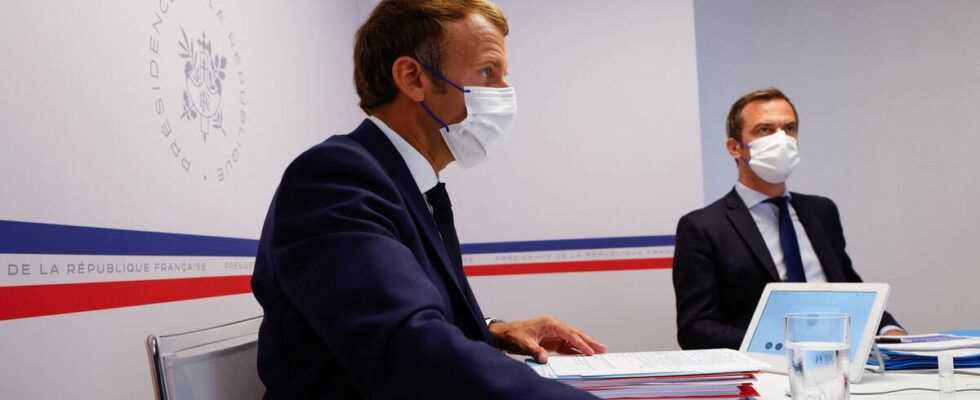The executive has an appointment Monday afternoon for a new Health Defense Council in the midst of a wave of omicron variant. Several avenues are being studied, including limiting the days of isolation for people with contact cases.
If the contamination figures fell on Sunday, it is only because a very large number of pharmacies and Covid testing centers were closed on Boxing Day. The symbolic bar is there and requires the executive to work extra hard against the omicron variant: Saturday, for the first time since the start of the epidemic, in March 2020, there were more than 100,000 cases in twenty-four hours in France.
Monday morning, a few hours before the meeting – chaired by Emmanuel Macron by videoconference before a Council of Ministers in due form – the media are exploring all the potential avenues of this round of health screw. One certainty, hammered home by the ministers cited in all directions: the vaccination campaign which is in full swing, especially for booster doses, places the government in a different situation from last year, when a curfew was imposed for December 31 (among others).
Return of the mask outdoors
According to France Info, the obligation to wear a mask outside will once again be on the agenda, “In particular in the center of large towns and in the event of crowds”. In Savoie, this is already the case. A prefectural decree extended the measures in force since November 30, obliging people aged 11 and over to wear a mask, including outdoors, in places with more than ten people, such as markets, theaters, etc.
Reduced isolation for omicron contact cases
Due to its great contagiousness, the omicron variant has led the Ministry of Health to issue specific rules on the isolation of contact cases. With the delta variant, a fully vaccinated contact person was not required to self-isolate but had to undergo two tests (one immediately after the last contact with the sick person and another five to seven days later). For omicron, since December 13, the rules are different: seven days of isolation in the event of contact with a positive person, a figure which increases to … 17 if the contact case lives in the same household as the positive person.
In its Monday edition, the Parisian writes that the government will reduce this period of isolation “To limit absenteeism in companies”: the envisaged track would be a “Tolerance for negative, asymptomatic and vaccinated contact cases”. Track confirmed on the side of France Info: “The executive therefore plans to eliminate the isolation period for contact cases of a person positive for the omicron variant, provided they have a complete vaccination schedule.”
No New Year’s Eve curfew
Last year, it was introduced for the New Year, in the hope of discouraging festive gatherings conducive to contamination. We already know that the fireworks have been canceled for this year and that the sale of alcohol and food will be prohibited on public roads. According to BFMTV, the hypothesis of a formal curfew is “Unlikely at this stage”. “There is no question of establishing a curfew for New Year’s Eve, December 31” , abounds France Info. “For the moment, this track does not hold the cord among the evoked assumptions”,writes for his part France Inter in the middle of the day. On the other hand, the government would consider the creation of a “super pass”, with a negative test in addition to a complete vaccination, for certain places. “At very high risk” , like nightclubs, which remain closed for now.
What about schools and schoolchildren?
In a tribune at Sunday newspaper, around fifty caregivers are also asking the government to delay the start of the January 3 school year, “At high risk given its proximity to the New Year’s festivities, with recourse to distance education until the return to thresholds of publicly defined health indicators”.But several media believe Monday morning that this track, also claimed by several opposition leaders, including Valérie Pécresse, will not be part of the arsenal announced at the end of the day. “If the subject will be discussed, it is at this stage unlikely that the school holidays will be extended”, writes BFMTV, citing “From government sources” . “Postponing the start of the school year also means asking parents to find childcare solutions for an additional week and some will have no other choice but to stay at home”, can we read in the Parisian.According to information from France Inter, it will therefore not be “Finally no question”.
Vaccine pass at no charge
Initially scheduled for entry into force at the end of January, the bill establishing the vaccination pass will be examined in committee at the National Assembly from Wednesday, before going to the Senate from January 5. Its implementation is scheduled for January 15, according to the bill consulted by AFP. In detail, the text transforms the health pass into a vaccination pass “For access to leisure activities, restaurants and drinking establishments, fairs, seminars and trade shows or even interregional transport”, in particular rail. The only presentation of a negative test would however remain valid. “For access to health and medico-social establishments and services”.
Booster doses are getting louder
Pressure continues to mount on hospitals with 16,365 people currently hospitalized, or 506 new admissions in twenty-four hours. Faced with the emergency, the High Authority for Health (HAS) recommended Friday that the booster dose can be performed from three months for the eligible population. For its part, the Ministry of Health announced that the deadline would be reduced to four months from now – until then it was five months after the last injection – and not from January 3 as initially envisaged. In its opinion, the HAS also recommended the administration as of now of a booster dose in 12-17 year olds suffering from immunodeficiency or a serious risk comorbidity.
Update at 1:10 p.m. with details on schools and New Years.
